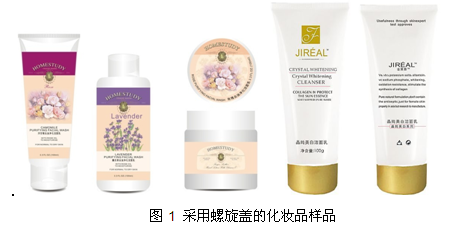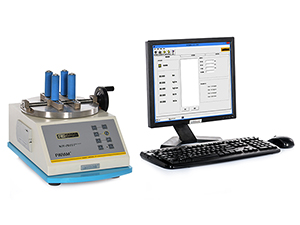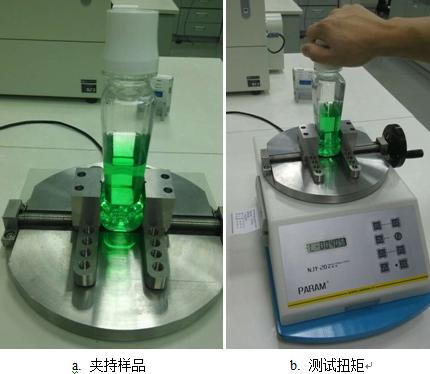Summary
: The torque value for opening and locking bottle caps in products like bottled cosmetics is a key parameter controlled during offline or online production. Whether the torque is appropriate has a significant impact on product transportation and consumer use. This article provides a detailed introduction to the testing process and principle of the opening torque of cosmetic bottle caps using the NJY-20 torque meter, offering practical guidance for quality control in the cosmetics industry.
Labthink Languang NJY-20 Torque Meter
The NJY-20 torque meter tests the opening torque of bottle caps, helping determine if the cap is easy to open and whether it leaks. It serves as a technical reference for maintaining product quality in the cosmetics sector.
Keywords:
: Bottled cosmetics, nozzle packaging, hose packaging, bottle mouth, opening torque, easy opening, leakage, torque meter
1. Significance
People apply makeup to their skin or facial features through methods like applying, spraying, or sprinkling, aiming to clean, beautify, care for, maintain, or modify appearance. Cosmetics can be categorized into liquid, emulsion, cream, powder, block, and oil types. Liquid and lotion cosmetics are typically packaged in bottles, tubes, or bags, with bottled cosmetics often made from plastic or glass. The bottle mouth can be of different types, such as twist-on or push-on. Twist-on caps require manual rotation to open, and improper torque can cause difficulty in opening or leakage issues.
To ensure that screw-cap cosmetics meet consumer expectations—offering convenient opening and reliable sealing—it’s essential to monitor the torque effectively. Jinan Languang Electromechanical Technology Co., Ltd. developed the NJY-20 torque meter to test the torque values of these caps, ensuring ease of use and leak resistance.

2. Current Status
Currently, the main standard for testing the opening torque of bottle caps in China is GB/T 17876-2010, which applies to caps made from polyolefin materials via injection molding or hot pressing. These caps cannot be resealed once opened.
3. Sample
A brand of lotion packaged in a plastic bottle with a plastic anti-theft cap was tested.
4. Testing Equipment
This study used the Labthink Languang NJY-20 torque meter to measure the opening torque of the sample.

Figure 2: NJY-20 Torque Meter
4.1 Test Principle
The device uses a torsion angle phase difference sensor and strain bridge detection to monitor electrical signals from the twisted elastic shaft during testing, measuring the torque required to open or lock the cap.
4.2 Application Scope
This equipment is designed for torque testing of bottle caps and lids in cosmetics, food, and pharmaceutical packaging (e.g., hand cream, beverage bottles, medicine bottles). It can also be used for thermos and bottle caps.
It complies with standards such as GB/T 17876, ASTM D2063, ASTM D3198, ASTM D3474, BB/T 0025, and BB/T 0034.
4.3 Device Parameters
- Torque range: 20 Nm, 40 Nm, 50 Nm, with an accuracy of 1% and resolution of 0.001 Nm.
- Clamping range: 5 mm to 170 mm (diameter).
- Supports both opening and locking force testing.
- Automatically records peak values for accurate results.
- Includes overload protection, automatic reset, and fault alerts for safety.
- Features LCD display and PVC control panel for user-friendly operation.
- Integrated Lystemâ„¢ data management system for report tracking.
5. Experimental Procedure
(1) Place the sample in the instrument fixture under standard lab conditions and clamp it securely.
(2) Set the mode to "Opening Torque" and start the test.
(3) Gently unscrew the cap while the instrument measures the torque automatically.
(4) Repeat the process for all samples.

Figure 3: Experimental Procedure
6. Test Results
The opening torque values for the three samples were 0.405 Nm, 0.421 Nm, and 0.417 Nm respectively.
7. Conclusion
The torque value of bottle caps is a critical parameter in the production of packaged cosmetics, nozzles, and tubes. Using the NJY-20 torque meter ensures high accuracy and stability, guaranteeing that products are easy to open and well-sealed. In addition to testing equipment, Labthink Languang offers professional services and solutions for container barrier testing globally. For more information, visit their website or contact them at 0531-85068566. Jinan Languang Electromechanical Technology Co., Ltd. is committed to enhancing technical collaboration with industry partners.
MPPT (Maximum Power Point Tracking) solar charge controllers are an essential component in solar power systems. They are used to regulate the charging process and maximize the efficiency of solar panels. By continuously tracking the maximum power point (MPP) of the solar array, MPPT charge controllers ensure that the maximum available power is extracted from the solar panels and delivered to the Battery bank.
MPPT charge controllers with built-in inverters are designed for off-grid solar power systems. In addition to regulating the charging process, they also convert the DC power from the solar panels into AC power that can be used to power household appliances. These charge controllers are commonly used in remote locations where grid power is not available.
MPPT charge controllers with built-in load control are designed to regulate the charging process and control the power output to a specific load. They are commonly used in applications where the solar power is directly used to power specific devices or equipment. They play a crucial role in maximizing the efficiency of solar power systems by continuously tracking the maximum power point of the solar array. Whether it is a standalone controller, a controller with built-in inverters, or a controller with built-in load control, MPPT charge controllers are essential for efficient solar power utilization.
MPPT Solar Charge Controller Inverter,Mppt Charge Controller,Off-Grid Storage Controller,Mppt Solar Controller
Bosin Power Limited , https://www.bosinsolar.com